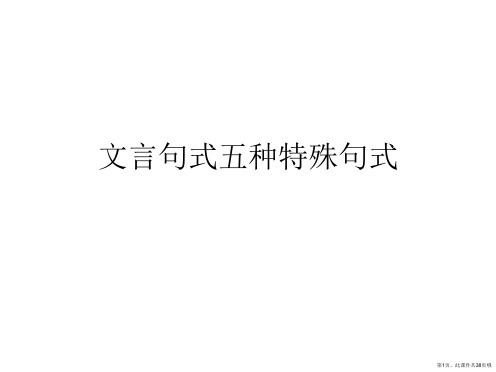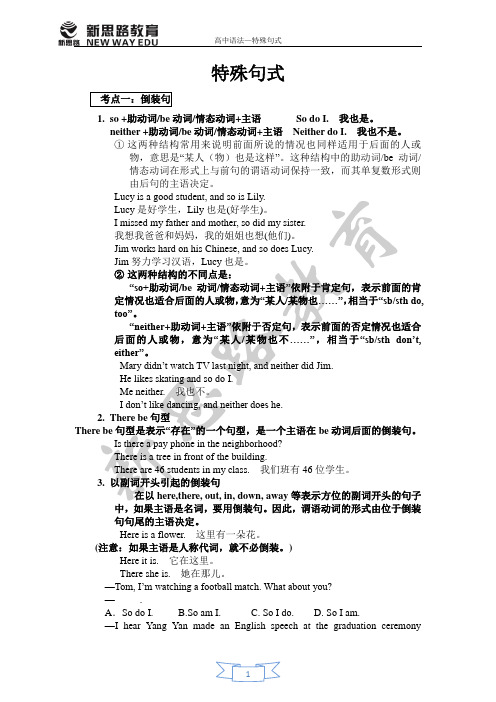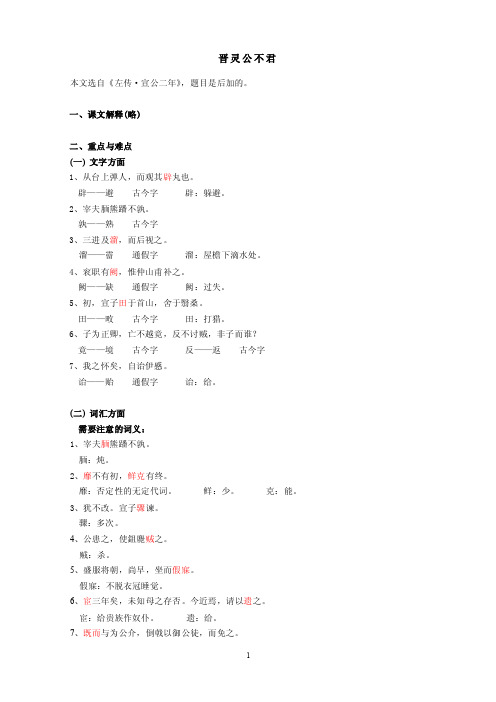第五讲 特殊句式
文言句式五种特殊句式课件

1.“于”表被动 ⑴而君幸于赵王
⑵六艺经传皆通习之,不拘于时,学 于余
第8页,此课件共38页哦
2.用“见”“见…于…”表被动。 ⑴秦城恐不可得,徒见欺。 ⑵臣诚恐见欺于王而负赵。 ⑶吾常见笑于大方之家。
第9页,此课件共38页哦
3.用“为”“为……所
……”“……为所”表被动。
省略宾语 与( )坐谈,问之客曰
第30页,此课件共38页哦
省略宾语
与(客)坐谈,问之客曰
第31页,此课件共38页哦
省略介词
将军战( )河北,臣战( )河南
第32页,此课件共38页哦
省略介词
将军战(于)河北,臣战(于)河南
第33页,此课件共38页哦
常见文言文固定格式
文言文中有一些固定搭配的句式,牢牢掌 握这些句式,对快速、正确的进行文言文翻 译有非常大的帮助。
人不知而不愠,不亦君子乎?
第37页,此课件共38页哦
2/16/2022
第38页,此课件共38页哦
1.省略主语。 2.省略谓语。 3.省略宾语。 4.省略介词。
第25页,此课件共38页哦
省略主语
1.……(
乃入。
)度我至军中,公
2.见渔人,乃大惊,问所从来 。( )具答之。便要还家 ,设酒杀鸡作食。
第26页,此课件共38页哦
省略主语
1.……( 公 )度我至军中,公乃 入。
2.见渔人,乃大惊,问所从来。( 渔人)具答之。便要还家,设酒杀 鸡作食。
第34页,此课件共38页哦
例如:
1、何以……?(根据什么……?凭什么……
?)
王曰:“何以知之?” 2、何所……?(所……的是什么?)
问女何所思,问女何所忆?
2018年广州中考听说英语及答案

2018年广州中考听说英语及答案1. 1.His father makes a living ____________ driving a taxi.【提升寒第5讲介词】【尖端&冲顶春第1讲形副介】 [单选题] *A. by(正确答案)B. forC. withD. through2. ______TV has some benefits, _______sometimes it has a bad influence.【提升春第7讲状从】【尖端&冲顶春第7讲宾+状+定】 [单选题] *A. Even though; butB. Although; /(正确答案)C. though; butD. even if; but3. My father was warned ________.【提升春第4讲非谓语动词】【尖端&冲顶春第3讲主谓一致+非谓语动词】 [单选题] *A. not to stay up(正确答案)B. to stay upC. stay upD. not stay up4. The teacher told us that the light_____________ faster than the sound.【提升春第6讲宾从【尖端&冲顶春第7讲宾+状+定】 [单选题] *A. travelB. travels(正确答案)C. traveledD. was traveling5. She spent two days _______________ this job. 【提升•寒:第4讲非谓语动词】【尖端&冲顶•寒:第3讲主谓一致+非谓语动词】 [单选题] *A. to finishB. finishing(正确答案)C. finishD. for finishing6. Would you like ________ shopping with us?—I'd like to. But I'm busy ________ the housework.【提升•春:第3讲特殊句式】【尖端&冲顶•春:第5讲特殊句式】 [单选题] *A. going;to doB. to go; doing(正确答案)C. to go;to doD. going; doing7. — Would you please tell me ______ in today's newspaper?—Sorry, I haven't read it yet.【提升•寒:第2讲代词】【尖端&冲顶•寒:第1讲名冠代数】 [单选题] *A. something important(正确答案)B. important somethingC. anything importantD. important anything8. Not using eye contact can cause problems, but using too much is not polite ________ 【提升•寒:第4讲语法形副】【尖端&冲顶•春:第1讲形副介】[单选题] *A.tooB.either(正确答案)C.neitherD.also9. They are ________ to protect themselves.【提升•寒:第4讲语法形副】【尖端&冲顶•春:第1讲形副介】 [单选题] * A.too strongB.strong enough(正确答案)C.so strongD.such strong10. .—Jenny, have you ever been to The Grand Canyon?—Yes, I ______there with my parents last year.【提升寒:第六讲】【尖端&冲顶寒:第四讲】 [单选题] *A. have goneB. have beenC. went(正确答案)D. would go11. .—I don't know when_______tomorrow.—I will call you as soon as he__________ .[单选题] *A. will he come; arrivesB. he will come; arrives(正确答案)C. he will come; will arriveD. he comes; will arrive12. As we know, many great men never _______no matter what difficulties they face. 【提升寒:第六讲】【尖端&冲顶寒:第四讲】 [单选题] *A. run awayB. give up(正确答案)C. stay upD. cheer up13. The charity walkers arrived at the small town ______a rainy morning. 【提升寒:第五讲】【尖端&冲顶春:第一讲】 [单选题] *A. inB. atC. forD. on(正确答案)14. Learning to do some team work with ______is important in our daily life.【提升寒:第二讲】【尖端&冲顶寒:第一讲】 [单选题] *A. otherB. the otherC. others(正确答案)D. another15. .I'm sure that more rules ____________ to deal with air pollution very soon. 【提升春:第一讲】【尖端&冲顶寒:第四讲】 [单选题] *A. madeB. will be made(正确答案)C. were madeD. will make16. _______interesting it is to welcome the first snow in the Year of the Rooster!【提升春:第三讲】【尖端&冲顶春:第五讲】 [单选题] *A. WhatB. How(正确答案)C. What aD. What an17. —Who is the lady over there? Is it Miss Wang?—It __________be her. Miss Wang is much taller.【提升春:第2讲】【尖端&冲顶春:第1讲】 [单选题] *A. needn'tB. mustn'tC. shouldn'tD. can't(正确答案)18. The ring is made ____________ silver and it is made_______ France. 【提升寒:第5讲】【尖端&冲顶春:第1讲】[单选题] *A. of; byB. of; in(正确答案)C. from; byD. into; in19. —What did you say just now, Mom?—I asked you ________.【提升春:第6讲】【尖端&冲顶春:第7讲】[单选题] *A. if was there a bookstore around hereB. why you wanted to become an inventor(正确答案)C. how long you will be on the volleyball teamD. that you were talking about the important invention20. —How do you like the TV program?—I think it is the best program ________ I have ever watched.【提升春:第8讲】【尖端&冲顶春:第7讲】 [单选题] *A. whoB. whichC. that(正确答案)D. when21. They have no paper_______.【提升春:第4讲】【尖端&冲顶春:第3讲】 [单选题] *A. to writeB. to write withC. write onD. to write on(正确答案)22. —_______ my dictionary? I can't find it anywhere.—I _______ it on the desk when I came in.【提升寒:第6讲】【尖端&冲顶寒:第4讲】 [单选题] *A. Did you see; have seenB. Have you seen; have seenC. Have you seen; saw(正确答案)D. Did you see; see23. We must plant more trees after we _______ every year.【提升寒:第6讲】【尖端&冲顶寒:第4讲】 [单选题] *A. cut off themB. cut them offC. cut down themD. cut them down(正确答案)24. —Does the government stop the factory _______ dirty water into the river? —Yes. The factory stops _______ now.【提升春:第4讲】【尖端&冲顶春:第3讲】[单选题] *A. to pour; to pourB. pour; pouringC. from pouring; to pourD. from pouring; pouring(正确答案)25. —May I go to the cinema with Tom tomorrow, mom?—Of course, if your homework _______ by then.【提升•春:第1讲被动语态】【尖端&冲顶•寒:第4讲时态+语态】[单选题] *A.will be finishedB.finishC.will finishD.is finished(正确答案)26. — Mind your step! Someone has fallen over because of the wet floor.— _________.【提升•春:第3讲特殊句式】【尖端&冲顶•春:第5讲特殊句式】 [单选题] * A.Thanks a lot(正确答案)B.That’s not the caseC.I can’t agree moreD.Don’t mention it27. We are not allowed to bring any snacks to the sports meeting. ---_____________. 【提升•春:第3讲特殊句式】【尖端&冲顶•春:第5讲特殊句式】 [单选题] * A.Neither are we(正确答案)B.Neither do weC.So are weD.So do we28. — Which colour do you prefer?— ______ blue ______ white is OK. They are both my favourites.【提升•春:第3讲特殊句式】【尖端&冲顶•春:第5讲特殊句式】 [单选题] * A.Both; andB.Neither; norC.Not; butD.Either; or(正确答案)29. Our business won't improve______________ we offer better service to our customers. 【提升春第7讲状从】【尖端&冲顶春第7讲宾+状+定】 [单选题] *A. becauseB. unless(正确答案)C. afterD. since30. he teacher told us that the light_____________ faster than the sound.提升春第6讲宾从【尖端&冲顶春第7讲宾+状+定】 [单选题] *A. travelB. travels(正确答案)C. traveledD. was traveling31. —Tina, what did you do last weekend?—I just ______ on the sofa and watched TV.[单选题] *A. lieB. lay(正确答案)C. laidD. lied32. The relationship between China and the USA is always ______ by the whole world. [单选题] *A. paid attentionB. pay attention toC. paid attention to(正确答案)D. paying attention33. I ______ Mr. Zhao since I ______ here 3 years ago. [单选题] *A. knew; cameB. have known; came(正确答案)C. knew; have come34. They won't go to the Great Wall if it _______ tomorrow. [单选题] *A. rainB. rainingC. rains(正确答案)D. will rain35. I ____a fruit salad half an hour ago. Can it ______now?—One more minute please.[单选题] *A. ordered; be served(正确答案)B. have paid for; serveC. have ordered;be servedD. paid; serve36. I canˈt wear the mask, itˈs too hot.—For your health, Iˈm afraid you________ .[单选题] *A. mayB. have to(正确答案)C. canD. need37. Have you ever heard the phrase "You never get a second chance to make a first impression(印象)”? It may sound like an unusual piece of advice, but it is true-the first impression someone has of you when meeting you for the first time will probably influence how that person treats you or reacts to you in the future.What is even more interesting is that the brain takes in all the information to create that first impression in about three seconds. When you meet someone for the first time,by the time you have stated your name or shaken hands, the other person has already formed an opinion about the kind of person you are.So how do you make a good first impression? All things grown-ups tell you-- such as being polite, and being well-dressed---are very important. However, the most important tool for making a good first impression is your face. Smiling, being responsive, and looking like you are happy will almost always leave a positive(积极的) impression onpeople, especially those who do not know you. Most people, generally speaking, are ready to smile back when they are smiled at.Furthermore, smiling and being in a positive mood helps you to know and get a better understanding of new things. This means that you can possibly be friendlier to people you do not know and be more creative and able to solve problems more quickly. So if you ever need a reason to be happy, think about the wonderful people you might meet and impress--with a cheerful smile.根据材料内容选择最佳答案。
第五讲《师说》-2022届高三语文文言文回归教材第一轮复习

,舞交衢,逐禽左。” 谓行车时和鸾之声相应;车随曲岸疾驰而
不坠水;经过天子的表位有礼仪;过通道而驱 驰自如;行猎时追逐禽兽从左面射获。
(5)书:书法(书写,识字,文字) 六书:象形 、 指事、会意、形声、转注、假借。(注:转注、假借 是识字方法 ,而象形 、指事、会意、形声是造字方 法,其中形声字约占百分之九十。)
(3)射:射箭技术
五射:白矢、参连、剡注、襄尺、井仪。白矢,箭 穿靶子而箭头发白,表明发矢准确而有力;参连, 前放一矢,后三矢连续而去,矢矢相属,若连珠之 相衔;剡注,谓矢行之疾;襄尺,臣与君射,臣与 君并立,让君一尺而退;井仪,四矢连贯,皆正中 目标。
(4)御:驾驭马车的技术 《周礼·地官·保氏》:“乃教之六艺……
(4).D
25
实战演练
(4).D A项中用顾况对白居易前后评价的对比,面写了白居易的オ华。 B项在原文一、二段都能找到合理解释。C项在原文第段中提到 “言言皆实”“不尚艰难”“老妪读之”,与题中内容“真实,辞句晓畅, 风格平易”相合。D项中的白居易“处江湖之远,则“独善其身”说 法不正确。“儒、释两家思想的影响,并存于他人生的各个阶段” 在文中无据,说法也不正确。白居易在唐宪宗元和六年(811年) 至八年离开官场时,依然写下《村居苦寒》一诗,在诗中写道 “回观村闾间,十室八九贫”“念此深可愧,自问是何人?”,可见 白居易即使是“处江湖之远”,依然忧国忧民,所以此句赏析说法 不正确。
(判断句)
13
文言知识梳理
⑵彼童子之师,授之书而习其句读者,非吾所谓传 其道解其惑者也。 找出该句的文言现象并进行拓展 这两个“其”都是代词。请速读第二自然段找出“其” 作为语气副词的不同用法。 ①圣人之所以为圣,愚人之所以为愚,其皆出于此 乎? ②今其智乃反不能及,其可怪也欤。
特殊句式讲解

特殊句式1.so +助动词/be动词/情态动词+主语So do I. 我也是。
neither +助动词/be动词/情态动词+主语Neither do I. 我也不是。
①这两种结构常用来说明前面所说的情况也同样适用于后面的人或物,意思是“某人(物)也是这样”。
这种结构中的助动词/be动词/情态动词在形式上与前句的谓语动词保持一致,而其单复数形式则由后句的主语决定。
Lucy is a good student, and so is Lily.Lucy是好学生,Lily也是(好学生)。
I missed my father and mother, so did my sister.我想我爸爸和妈妈,我的姐姐也想(他们)。
Jim works hard on his Chinese, and so does Lucy.Jim努力学习汉语,Lucy也是。
②这两种结构的不同点是:“so+助动词/be动词/情态动词+主语”依附于肯定句,表示前面的肯定情况也适合后面的人或物,意为“某人/某物也……”,相当于“sb/sth do,too”。
“neithe r+助动词+主语”依附于否定句,表示前面的否定情况也适合后面的人或物,意为“某人/某物也不……”,相当于“sb/sth don’t,either”。
Mary didn’t watch TV last night, and neither did Jim.He likes skating and so do I.Me neither. 我也不。
I don’t like dancing, and neither does he.2.There be句型There be句型是表示“存在”的一个句型,是一个主语在be动词后面的倒装句。
Is there a pay phone in the neighborhood?There is a tree in front of the building.There are 46 students in my class. 我们班有46位学生。
第五讲晋灵公不君

晋灵公不君本文选自《左传·宣公二年》,题目是后加的。
一、课文解释(略)二、重点与难点(一) 文字方面1、从台上弹人,而观其辟丸也。
辟——避古今字辟:躲避。
2、宰夫胹熊蹯不孰。
孰——熟古今字3、三进及溜,而后视之。
溜——霤通假字溜:屋檐下滴水处。
4、衮职有阙,惟仲山甫补之。
阙——缺通假字阙:过失。
5、初,宣子田于首山,舍于翳桑。
田——畋古今字田:打猎。
6、子为正卿,亡不越竟,反不讨贼,非子而谁?竟——境古今字反——返古今字7、我之怀矣,自诒伊慼。
诒——贻通假字诒:给。
(二) 词汇方面需要注意的词义:1、宰夫胹熊蹯不孰。
胹:炖。
2、靡不有初,鲜克有终。
靡:否定性的无定代词。
鲜:少。
克:能。
3、犹不改。
宣子骤谏。
骤:多次。
4、公患之,使鉏麑贼之。
贼:杀。
5、盛服将朝,尚早,坐而假寐。
假寐:不脱衣冠睡觉。
6、宦三年矣,未知母之存否。
今近焉,请以遗之。
宦:给贵族作奴仆。
遗:给。
7、既而与为公介,倒戟以御公徒,而免之。
既而:不久。
8、我之怀矣,自诒伊慼。
伊:指示代词,那。
慼:忧愁。
(三) 语法方面1、词类活用现象⑴晋灵公不君。
君:行君道,名词用作动词。
⑵秋九月,晋侯饮赵盾酒,伏甲将攻之。
饮:使……饮,使动用法。
⑶公嗾夫獒焉。
明搏而杀之。
嗾:嗾使,名词用作动词。
⑷食之,舍其半。
食:给……吃,使动用法。
⑸既而与为公介,倒戟以御公徒,而免之。
免:使……免于难,使动用法。
2、特殊句式宾语前置⑹谏而不入,则莫之继也否定句中,代词作宾语,前置。
省略句⑺君能有终,则社稷之固也(赖之),岂唯群臣赖之。
三、译文晋灵公不行君道。
加重赋税用来彩饰墙壁。
他还从台上用弹弓射人,观看人们躲避弹丸来取乐。
(有一次)厨师炖熊掌没有炖熟,灵公就杀死他,把尸体装在草筐里,命妇女用车装着尸体经过朝廷。
赵盾和士季发现了厨师的手,追问厨师被杀的原因,并为这件事忧虑。
赵盾准备进谏,土季说:“您进谏,如果国君不接受,那就没有谁能接着进谏了。
请让我先去吧,没有采纳,您再继续劝说。
特殊句式(强调、倒装、省略及其他)精品课件

(2)这种强调句的一般疑问句只需把is(was)提前。
Was it in 1939 that the Second World War broke out?
第二次世界大战是在1939年爆发的吗? Is it Professor Wang who teaches you English?
It is I who/that am right.(强调主语) 我才是对的。
It was him that/who/whom we met at the school gate.(强 调宾语)
我们在学校门口遇到的是他。
It was because her mother was ill that she didn't go to work.(强调状语)
There seems to be something wrong with the machine.
好像机器出了点问题。
(2)Here/There/Now/Then/Thus+不及物动词+名词
There goes the bell.Let's go into the lecture hall.
许多电影来自于美国,但我们的确也给其他国家的影片颁 奖。
He did come to see you last Sunday,but you were out.
他上周日的确来看过你,但是你出去了。
热点考向二 1. 完全倒装
倒装
(1)There be+主语+...,此结构中的be有时用 stand/exist/lie/live/flow/seem等不及物动词代替
教你们英语的是王教授吗?
(3)它的特殊疑问句只需在一般疑问句前加上特殊疑问词。
高中英语高考5 第五讲 特殊句式
第五讲特殊句式语法填空【典题试做】1.(2018·全国卷Ⅱ)China’s approach to protecting its environment while feeding(feed) its citizens “offers useful lessons for agriculture and food policymakers worldwide,”says the bank’s Juergen V oegele.2.(全国卷Ⅱ)It could be anything—gardening, cooking, music, sports—but whatever it is, make(make) sure it’s a relief from daily stress rather than another thing to worry about.在语法填空中强调句是高考考查的重点,倒装句是高考书面表达的得分点。
此外,状语从句中的省略、祈使句和there be句型的主谓一致也是高考考查的重点项目。
短文改错【典题试做】(2017·全国卷Ⅰ)The instructor kept repeating the words,“Speed up!”“Slow down!”“Turning left!” Turning→Turn1.倒装句中助动词或系动词的缺失或误用;2.强调句型中it或that的误用;3.感叹句中what和how 的误用;4.祈使句中动词原形的误用;5.There be句型中be动词单复数的误用。
强调句1.陈述句式:It is/was+被强调部分+that/who+其他.(强调人时可用that或who,强调物时只用that)一般疑问句:Is/Was +it+被强调部分+that/who+其他?特殊疑问句:疑问词+is/was+it+that+其他?(2017·天津卷)It was when I got back to my apartment that I first came across my new neighbors.正是当我回到公寓的时候,我第一次遇到我的新邻居们。
人教七年级下册英语寒假班第5讲 Unit 5基础版(教师版含答案)
第五讲Unit5 Why do you like pandas? 基础版单元目标总览:【知识点详解】1、Let’s see the pandas first.(1)本句是一个祈使句,句式为“Let’s do sth.”意为“让我们……吧。
”主要用来提出建议和请求, 劝对方一起做,包括听话者在内。
它的否定式是“Let’s not do sth.”,意为“让我们不做某事”。
◆Let’s play games together. 我们一起做游戏吧。
◆Let’s not tell anyone. 我们谁也别告诉。
(2)“Let us do sth.”意为“让/允许我们做某事”,表示提出请求,请对方允许,不包括听话者在内。
◆Let us go with you, my dear mother. 亲爱的妈妈,让我们和你一起去吧。
2、Because they are cute.因为他们非常可爱。
cute形容词,“聪明的,可爱的”,多指小动物聪明可爱,也可以指小女孩聪明伶俐,招人喜爱。
◆The panda is very cute. 熊猫很可爱。
3、Why do you like pandas?(1)本句是why引导的特殊疑问句,用来询问原因;它的句式是“Why + be动词/ 情态动词/ 助动词+ 主语+ 动词?”。
意为“为什么做……”。
这个句式常用because引导的句子来回答。
because是连词,表示直接的理由。
◆-Why is he here? 他为什么在这儿?-Because he has things to do. 因为他有事要做。
◆-Why do you study English?你为什么学英语?-Because it’s important. 因为它很重要。
(2)why还可以表示建议,常用于句型“Why not + do sth.?或Why don’t you + do sth.?”意为“为什么不……?”。
特殊句式的作用和答题模式语文
特殊句式的作用和答题模式语文一、宾语前置的种类常见的宾语前置句式有以下几种:1、疑问句中代词宾语前置疑问代词作宾语,要放在动词或介词的前面。
在古代汉语里,使用频率大的疑问代词是“何”字,其他的还有“谁、孰、恶、安、焉、胡、奚、曷、盍(译为“何不”)”等,它们作宾语时,也放在动词谓语前面。
例:大王来何操?(司马迁《鸿门宴》)沛公安在?(司马迁《鸿门宴》)2、否定句中代词宾语前置否定句中动词的宾语如果是代词,这个代词宾语一般要放在动词的前面,这是古汉语特有的用法。
否定副词:不、弗、未、否、勿、毋、无、莫、非例:闻道百,以为莫己若者?(庄子《秋水》)3、陈述句中介词宾语前置介词宾语不是疑问代词,但是为了强调它,也放在介词的前面,这种情况最常见的是“以”的宾语前置。
例:余是以记之。
(苏轼《石钟山记》)再比如:一言以蔽之,夜以继日,“一言以蔽之”,宾语“一言”,放在“以”的前面,以示强调,意思是“拿一句活就能概括它”。
“夜以继日”,宾语“夜”,放在“以”的前面,意思是“拿夜晚来继续白天”。
“一言以蔽之”、“夜以继日”即“以一言蔽之”、“以夜继日”。
像成语“严以律己”“宽以待人”“坐以待毙”等都属于这种格式。
另外,介词宾语是方位词,也放在介词的前面。
例如:项王,项伯东向坐;亚父南向坐——亚父者,范增也;沛公北向坐;张良西向侍。
(《鸿门宴》)这里的“东”“南”“北”“西”都是方位词,都充当“向”的宾语,放在前面,以示强调。
翻译成现代汉语应是“向东”“向南”“向北”“向西”。
4、用“之”“是”(斯)作标志的宾语前置用“之”或“是”把宾语提到动词前面,以加重语气。
例:句读之不知,惑之不解。
(韩愈《师说》)无乃尔是过与?(《季氏将伐颛臾》)5、特殊情况:“相”字解释为“动作偏指一方”时,可译为“我,你、他(她)”,这时“相”用在动词谓语之前。
如:儿童相见不相识,笑问客从何处来(我)“见”解释为“动作偏指一方”时,可译为“我”,这时“见”字也常常放在动词谓语前,表示“对自己怎么样”。
《文言文特殊句式》课件PPT
THANKS
判断句的构成与分类
肯定判断句
主语和谓语之间是肯定关系,表示主 语所代表的事物具有某种性质或特征。
否定判断句
主语和谓语之间是否定关系,表示主语 所代表的事物不具有某种性质或特征。
判断句的语义关系
等同关系
主语和谓语所代表的事物相等或等同, 如“吾乃常山赵子龙”。
存在关系
主语和谓语之间通过比喻来表达某种 相似性或关联性,如“君者,舟也; 庶人者,水也”。
构成
固定句式通常由特定的词语组合而成,包括动词、形容 词、副词、连词等。这些词语在固定句式中具有一定的 语法功能和语义作用。
分类
根据表达方式和语义功能的不同,固定句式可分为多种 类型,如判断句、被动句、疑问句、感叹句等。每种类 型都有其特定的构成方式和表达效果。
ቤተ መጻሕፍቲ ባይዱ
固定句式的语义关系
01
语义指向
固定句式的语义关系通常指向句子中的某个成分,如主语、宾语、状语
教育价值
通过学习和掌握文言文特殊句式,可以提高学生的语言素养和表达能力,培养其对中华优秀传统文 化的热爱和传承意识。
文化价值
文言文特殊句式作为古代汉语的重要组成部分,承载着丰富的历史文化信息,对于传承和弘扬中华 优秀传统文化具有重要意义。
02 判断句
判断句的定义与特点
01
定义:判断句是对事物的性质、情况、关系等 做出肯定或否定判断的句子。
构成
倒装句通常由被强调的部分和谓语部分组成,其中被强调的部分可以放在句首或句中,谓语部分则相应地 进行倒装。
分类
根据被强调的部分和谓语部分的位置关系,倒装句可分为完全倒装和部分倒装两种类型。
倒装句的语义关系
01
- 1、下载文档前请自行甄别文档内容的完整性,平台不提供额外的编辑、内容补充、找答案等附加服务。
- 2、"仅部分预览"的文档,不可在线预览部分如存在完整性等问题,可反馈申请退款(可完整预览的文档不适用该条件!)。
- 3、如文档侵犯您的权益,请联系客服反馈,我们会尽快为您处理(人工客服工作时间:9:00-18:30)。
第五讲特殊句式[思维导图]Ⅰ.强调一、强调句型1.强调句型的基本结构:It is/was+被强调的部分+that/who+句子其他部分。
该句型可对句子的主语、表语、宾语、状语等进行强调。
(1)引导词的运用:当被强调部分是人,且作主语时,可用who或that,其他情况下一律用that。
It is only by listening to and understanding each other that problems between parents and children can be settled.只有通过倾听和相互理解,父母和孩子之间的问题才可能被解决。
(2)时态的运用:强调句中be的时态要依据原句的时态而定,即原句为过去的某种时态,则强调句中的be就用was;原句为现在的某种时态,强调句中用is。
有时还可用It might be/must have been/can’t be...that/who...等句式。
It is Jack who loves football most in our class.我们班最喜爱足球的人是杰克。
It must have been Eda who phoned yesterday.昨天一定是伊达打来的电话。
(3)人称和数的运用:强调主语时,要注意连接词和谓语的一致性。
It is our teacher who/that helps us make great progress.正是我们的老师帮助我们取得了很大的进步。
(4)对not...until...句式的强调:It is/was not until...+that+句子其他部分。
It was not until he got home 30 minutes later that he found he had left his bag in the taxi.直到他到家三十分钟后才发现他把包落在了出租车上。
2.强调句型的一般疑问句结构:Is/Was +it+被强调的部分+that/who+句子其他部分?Was it in the park that he met our new teacher?他是在公园里遇到我们的新老师的吗?3.强调句型的特殊疑问句结构:特殊疑问词+is/was+it+that+句子其他部分?When was it that he made up his mind to take this course?他是什么时候决定选修这门课程的?[名师指津] 由疑问词引导的强调结构在句中作宾语从句时,从句必须使用陈述语序。
She doesn’t know who it was that saved her son.她不知道是谁救了她的儿子。
二、强调谓语动词助动词do,does或did用来强调谓语动词,用于一般现在时和一般过去时的肯定的陈述句中,do还可以用于祈使句。
She did tell me her address,but I forgot all about it.她确实告诉过我她的地址,但我全忘了。
Ⅱ.省略一、状语从句中的省略在时间状语从句、条件状语从句、让步状语从句和方式状语从句中,若谓语部分含be动词,而主语又与主句的主语一致或从句主语是it时,从句的主语和谓语中的be动词可以一起省略。
All the photographs in this book,unless (the photographs are) stated otherwise,date from the 1950s.这本书里所有的照片,除非有说明,否则,都要追溯到20世纪50 年代。
二、动词不定式的省略在主动语态中,感官动词或使役动词后接不定式作补足语时,往往将不定式符号to省略;在同一句话或同一情景对话中,当同一动作再次出现在后面的不定式位置上时,通常省略该动作而保留不定式符号to。
The driver wanted to park his car near the roadside but was asked by the police not to. 那名司机想把车停靠在路边,但是警察不允许他这样做。
三、so/not构成替代省略英语中还常常用so/not等来代替省略的肯定内容或否定内容,so/not多跟在I’m afraid/I hope/I think/I guess/I believe等开头的答句中。
—Do you think it will rain?—I hope so/not.——你认为会下雨吗?——我希望下/不下。
四、常用的省略结构if ever 如果有过的话if busy 如果忙的话if anything 如果有什么不同if possible 如果可能的话if so 如果那样的话if not 如果不的话if necessary 如果必要的话Ⅲ.倒装一、部分倒装1.将含有否定意义的副词或连词置于句首时引起的部分倒装结构。
这类词(组)有:never,seldom,rarely,little,few,at no time,by no means,no longer,hardly/scarcely...when...,no sooner...than...,not only...but also...,not until,nowhere,neither...nor...等。
Not until I lost my job did I realize I should improve my working skills.直到失去工作我才意识到我应该提高工作技能了。
2.“only+状语”置于句首时,主句要用部分倒装。
Only when you can find peace in your heart will you keep good relationships with others.只有当你的心态平和时,你才能与别人保持良好的关系。
3.so/such...that...结构中的so,such 连同它所修饰的成分共同位于句首表示强调时,主句要用部分倒装。
Such great progress did he make that he was praised.他取得了如此大的进步以至于受到了表扬。
4.表示前面所说的情况也适用于后者时,用倒装结构“so/neither/nor+助动词/系动词/情态动词+主语”(so表示肯定意义,neither/nor表示否定意义)。
I saw the film Wolf WarriorsⅡlast week; so did she.上周我看了《战狼2》这部电影,她也看了。
5.在as/though引导的让步状语从句中,从句的表语/状语/动词要位于句首,构成倒装结构。
如果位于句首的是单数可数名词,其前不加冠词。
Strange as it may sound,if you’re unsatisfied,the issue is not a lack of means to meet your desires but a lack of desires.尽管这听起来很奇怪,但是如果你不满意,问题不是缺少满足你的欲望的方法,而是你根本就没有欲望。
6. “may+动词原形”表示祝愿时,通常将may置于句首,构成倒装语序。
May you succeed.祝你成功。
二、全部倒装1.here,there,now,then,out,in,up,down,away,on the wall,in the room 等表示地点、时间或方位的副词或介词短语置于句首,且主语为名词时,句子用全部倒装。
John opened the door.There stood a girl he had never seen before.约翰打开门,他从来没见过的一位女孩站在那儿。
South of the river lies a small factory.河的南面有一个小工厂。
2.有时为平衡句子结构或突出、强调,将作表语的介词短语、形容词、副词或分词提到句首,构成“表语+系动词+主语”的完全倒装结构。
Present at the party were Mr.Green and many other guests.出席晚会的有格林先生,还有许多别的宾客。
Ⅰ.单句语法填空1.China’s approach to protecting its environment while________(feed) its citizens “offers useful lessons for agriculture and food policymakers worldwide,” says the bank’s Juergen V oegele.(2018·全国卷Ⅱ)答案feeding[考查省略。
when/while +现在分词短语作时间状语,相当于when/while 引导的时间状语从句。
]2.Next door to ours live (live) a black couple,who seem to have settled in this community for quite a long time.3.Absurd as/though it might sound,everyone present was amused by his adventure story in Africa.4.On the top of the hill stands (stand) a temple where the old man once lived. 5.Professor Salovery,who invented (invent) the term EQ,gives the following description: At work,it is IQ that__ gets you promoted.(2019·温州中学模拟) 6.But the fighting scenes alone don’t explain the movie’s success—it’s also the patriotism(爱国主义)and spirit of the film projects that have deeply impressed Chinese audiences.(2019·桐乡高级中学模拟)7.This technology did not spread to Europe until the 19th century,and it was by using the technology that the Americans drilled the first oil well in Pennsylvania in 1859.(2019·宁波中学模拟)8.The police were seeking more information to find out who it was that killed the rich merchant.9.—Who should be responsible for the action?—The boss is to blame.The employees just carried out the order as told (tell).10.When exposed (expose) to danger and conflict,men tend to increase blood pressure,feeling nervous or anxious.11.The city now is much noisier than it used to__be(be).Ⅱ.完成句子1.Not until we lose health do__we__know__its__value.直到失去了健康我们才知道它的价值。
